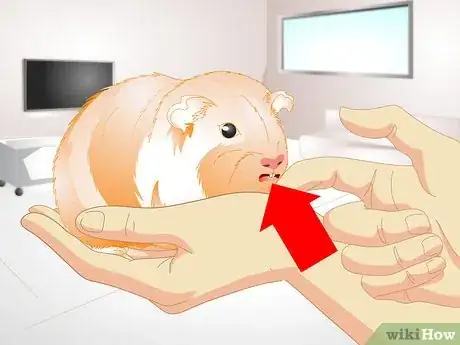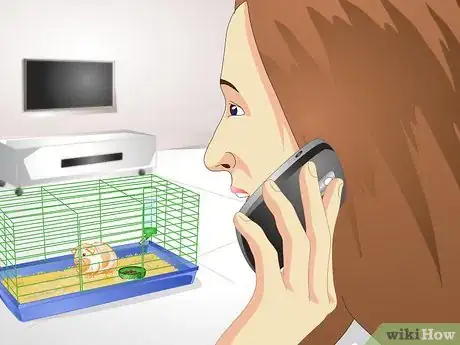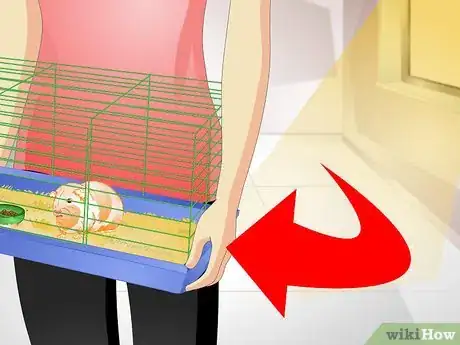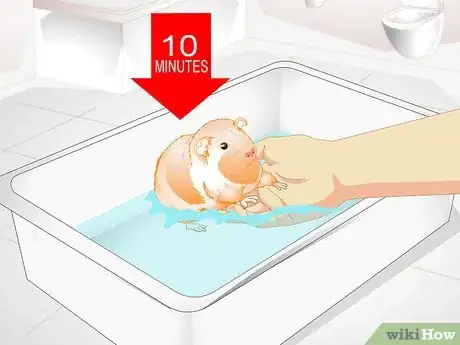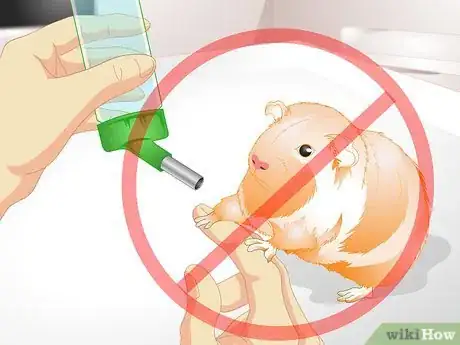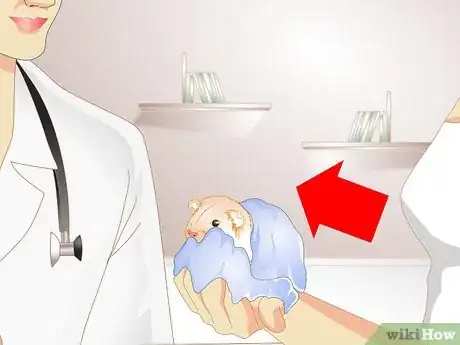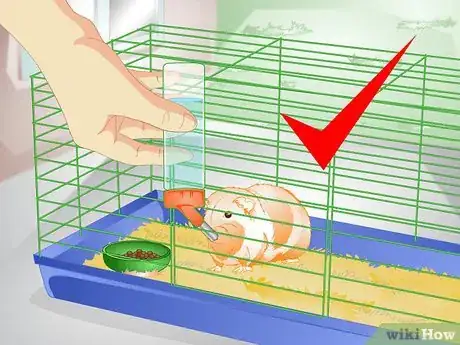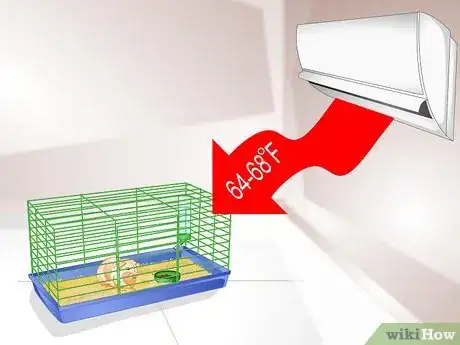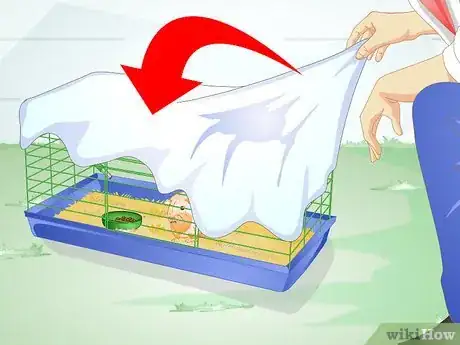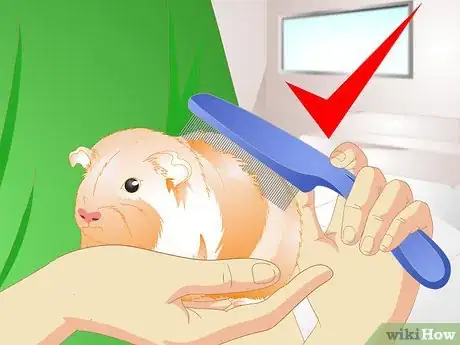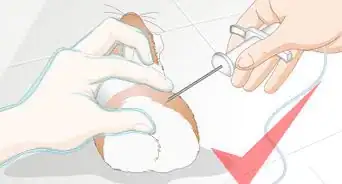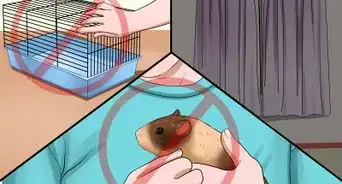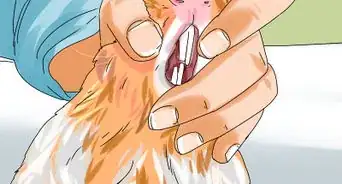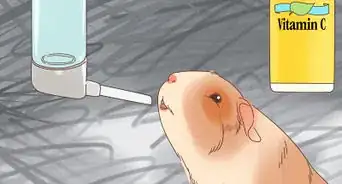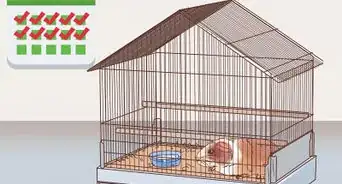This article was co-authored by Pippa Elliott, MRCVS. Dr. Elliott, BVMS, MRCVS is a veterinarian with over 30 years of experience in veterinary surgery and companion animal practice. She graduated from the University of Glasgow in 1987 with a degree in veterinary medicine and surgery. She has worked at the same animal clinic in her hometown for over 20 years.
This article has been viewed 53,285 times.
Guinea pigs are adorable little animals that make great pets. They can overheat easily, though, and become very sick. An overheated guinea pig needs to be treated by a veterinarian right away, so it will be important for you to recognize when your guinea pig is too hot and get him the care he needs as soon as possible.
Steps
Giving Your Overheated Guinea Pig First Aid
-
1Recognize the signs of heatstroke. Your guinea pig's small size increases his risk of heatstroke. When the outside temperature reaches at least 82 °F (28 °C) and the humidity is high, he may be at even higher risk of overheating.[1] Knowing what your guinea pig will look like when he is overheating will help you jump into action and get him the care he needs.
- Guinea pigs suffering from heatstroke will have trouble breathing, have a bright red tongue, and start slobbering ('wet chin'). They will also become very weak, look depressed, and maybe even start convulsing.[2]
- An overheated guinea pig can die if not treated quickly, so you need to be quick with noticing when he needs to cool down.[3]
-
2Call your veterinarian. Your veterinarian should know when your guinea pig is overheating. When you call, give the veterinary team as much information as you can about your guinea pig, such as how long he was outside, when you noticed he was overheating, and how he looks now. Calling your veterinarian will also let them know that you will be coming in with an emergency case.Advertisement
-
3Remove your guinea pig from the hot area. Take your guinea pig to a cool part of your house and start giving him first aid.[4] Guinea pigs are not able to cool off by sweating or panting, so your guinea pig will not be able to cool off on his own.
-
4Cool down your guinea pig. You may be scared at how sick your guinea pig looks, but you will need to stay calm and act quickly to help him feel better. Get a bowl and fill it with about an 1.5 inches (3.8 cm) of lukewarm water. Place your guinea pig's feet in the water for about 10 minutes, letting him stand if he is strong enough to do so.
- Continue to hold him if he is not able to stand on his own.
- If you do not have a bowl nearby, put the same amount of water in a sink and place your guinea pig's feet in the sink.
- It is very important that the water is lukewarm. Cold water could cool your guinea pig down too rapidly and cause him to go into shock.
- Slowly dampen the rest of your guinea pig's body (e.g., ears, abdomen) with the water. Do not submerse him completely in the water — this could also cause him to go into shock.
-
5Do not give fluids to a semi-conscious or unconscious guinea pig. Heatstroke plus dehydration equals a very sick guinea pig and trying to rehydrate him on your own could make him even sicker. For example, if he is having trouble breathing, he could accidentally inhale the liquid into his lungs. However, if the guinea pig is conscious offer him water to drink.
- Leave the task of rehydrating your guinea pig to your veterinarian.
-
6Take your guinea pig to your veterinarian. Your guinea pig will be very sick from overheating, so he will need treatment from your veterinarian as soon as possible. To keep him cool on your way to the veterinarian's office, place him on a cool, damp towel.[5]
- Dampen the towel with the same lukewarm water from the bowl or sink. You can also wrap your guinea pig in the towel.
- Turn on the air conditioning (AC) in your car. You could roll down the windows if the AC isn't working, but this may not let in enough cool to air to keep your guinea pig cooled down.[6]
- Your veterinarian will continue to give your guinea pig first aid by keeping him cool and rehydrating him with intravenous fluids. Your veterinarian will also give your guinea pig extra oxygen if he is having trouble breathing.[7]
- Your veterinarian will monitor your guinea pig intensively for signs of organ damage or failure due to heatstroke. This involves taking blood samples.[8]
- Your guinea pig will recover in a cool, quiet, and dark area of your veterinarian's office. Put him in the same type of area when you bring him home.
Preventing Your Guinea Pig From Overheating
-
1Give your guinea pig plenty of water. Your guinea pig needs water regardless of the temperature outside, but it will be even more important to keep him well hydrated in the spring and summer. Fill his water bottle with fresh, cool water. If you are not home during the day, use a large water bottle that will not run too low when you are away.
- Consider placing the water bottle on the outside of his cage, leaving only the tip of the water bottle's snout inside the cage. This would keep your guinea pig from chewing on and possibly damaging the sipper tube.[9]
- Refill the water bottle whenever the water level gets low.
- When you have your guinea pig outside, place the water bottle in the shaded part of his run or cage. The area of shade will change according to the position of the sun, so you will need to move the water bottle periodically.
-
2Turn up the AC. When it gets hot outside, it is best to keep your guinea pig inside. The ideal temperature for your guinea pig is 64 to 68 °F (18 to 20 °C). Depending on the temperature inside your house, you may have to crank up your AC to keep your guinea pig cool and comfortable.
- If you are using a portable air conditioner, make sure the air is not blowing directly into your guinea pig's cage. The direct airflow could lead to an upper respiratory infection. If you turned down the thermostat, make sure his cage is not in the direct path of the room's vents.
- Fans are good for evaporating sweat. However, since guinea pigs do not sweat, fans are not that useful.[10]
-
3Keep your guinea pig cool when he is outside. Having outside time is important for guinea pigs. You will need to take special precautions when you take him outside in the spring and summer. For example, take him outside when it is a little cooler—early in the mornings or late in the evening.
- If you have your guinea pig in a cage outside, cover his cage with cool, damp towels to create a cool, shaded area for him. Reposition the towels depending on the angle of the sun.
- Place ice packs or frozen water bottles in your guinea pig's run or cage. He can lie up against them to cool himself off. Wrap them in towels first so he does not get too cold or damage the skin on his paw pads.
- Put a ceramic tile or brick in his run or cage (whichever is most convenient for you to obtain). They repel heat and give your guinea pig something cool on which to lie.
- You can also fill a large bowl with ice cubes, cover it, and place it in his run or cage. He can lie against this to keep him cool. Covering it will keep him from falling in.[11]
- Consider spritzing your guinea pig occasionally with cool (not cold) water.
- Check on your guinea pig at least every 20 minutes when he is outside.
-
4Groom your guinea pig. Taking care of your guinea pig's coat can help keep him cool in the spring and summer. For example, combing and brushing his coat can remove excess fur and matts that could trap heat and cause your guinea pig to overheat.[12] Combs and brushes suitable for guinea pigs are available at your local pet store.
- Use a soft-bristled brush and brush in the direction of the fur, making sure not to pull the fur.
- For the matts, you can try to comb them out or cut them out with a pair of small scissors. Have another person wrap the guinea pig in a towel and hold him if you want to use scissors. If the matts are large, try to comb them out over several grooming sessions.
- Groom your guinea pig every day, especially if he has long hair.
- Take your guinea pig to a groomer if you are not comfortable grooming your guinea pig yourself.
Expert Q&A
-
QuestionHow long would it take for a guinea pig to die of heatstroke. Could the vet come over if the guinea pig is very sick?
 Pippa Elliott, MRCVSDr. Elliott, BVMS, MRCVS is a veterinarian with over 30 years of experience in veterinary surgery and companion animal practice. She graduated from the University of Glasgow in 1987 with a degree in veterinary medicine and surgery. She has worked at the same animal clinic in her hometown for over 20 years.
Pippa Elliott, MRCVSDr. Elliott, BVMS, MRCVS is a veterinarian with over 30 years of experience in veterinary surgery and companion animal practice. She graduated from the University of Glasgow in 1987 with a degree in veterinary medicine and surgery. She has worked at the same animal clinic in her hometown for over 20 years.
Veterinarian A guinea pig can die in as little as 20 - 30 minutes in extreme heat. Likewise, moderate heatstroke can result in organ damage that isn't revealed until several days later. Many vets will undertake a home visit to attend an emergency, but on the whole, it's preferable to take the guinea pig to the clinic, where the vet has access to a full range of resuscitation equipment.
A guinea pig can die in as little as 20 - 30 minutes in extreme heat. Likewise, moderate heatstroke can result in organ damage that isn't revealed until several days later. Many vets will undertake a home visit to attend an emergency, but on the whole, it's preferable to take the guinea pig to the clinic, where the vet has access to a full range of resuscitation equipment. -
QuestionMy grandson's guinea pig (aged two) had a stroke. What could have caused the stroke, and why would the vet advise against getting a replacement?
 Pippa Elliott, MRCVSDr. Elliott, BVMS, MRCVS is a veterinarian with over 30 years of experience in veterinary surgery and companion animal practice. She graduated from the University of Glasgow in 1987 with a degree in veterinary medicine and surgery. She has worked at the same animal clinic in her hometown for over 20 years.
Pippa Elliott, MRCVSDr. Elliott, BVMS, MRCVS is a veterinarian with over 30 years of experience in veterinary surgery and companion animal practice. She graduated from the University of Glasgow in 1987 with a degree in veterinary medicine and surgery. She has worked at the same animal clinic in her hometown for over 20 years.
Veterinarian Strokes are rare in guinea pigs, but can occur because of heart or brain disease, brain injury, infection, stress, toxins, or high blood pressure. If infection was the cause, the vet may advise against introducing a new guinea pig because of the risk of cross-infection. Alternatively, it might be the vet thinks the remaining guinea pig would find it hard to accept a newcomer. I would suggest speaking to the vet to clear this up.
Strokes are rare in guinea pigs, but can occur because of heart or brain disease, brain injury, infection, stress, toxins, or high blood pressure. If infection was the cause, the vet may advise against introducing a new guinea pig because of the risk of cross-infection. Alternatively, it might be the vet thinks the remaining guinea pig would find it hard to accept a newcomer. I would suggest speaking to the vet to clear this up. -
QuestionHow long can a guinea pig go without food or water?
 Pippa Elliott, MRCVSDr. Elliott, BVMS, MRCVS is a veterinarian with over 30 years of experience in veterinary surgery and companion animal practice. She graduated from the University of Glasgow in 1987 with a degree in veterinary medicine and surgery. She has worked at the same animal clinic in her hometown for over 20 years.
Pippa Elliott, MRCVSDr. Elliott, BVMS, MRCVS is a veterinarian with over 30 years of experience in veterinary surgery and companion animal practice. She graduated from the University of Glasgow in 1987 with a degree in veterinary medicine and surgery. She has worked at the same animal clinic in her hometown for over 20 years.
Veterinarian Sadly, no amount of time without food or water is safe. Guinea pigs need a constant throughput of food to keep their gut functioning. Starving can make the gut go to sleep and go into stasis. This is a serious condition that is hard to reverse and can lead to death.
Sadly, no amount of time without food or water is safe. Guinea pigs need a constant throughput of food to keep their gut functioning. Starving can make the gut go to sleep and go into stasis. This is a serious condition that is hard to reverse and can lead to death.
Warnings
- The onset of heatstroke can be very quick. Take your guinea pig veterinarian as soon as you can.⧼thumbs_response⧽
- Serious heatstroke can lead to organ damage and failure, which could put your guinea pig's life at risk. If your guinea pig survives a bout of serious heatstroke, he will probably need ongoing veterinary care to treat the organ damage.[15]⧼thumbs_response⧽
- Cooling off an overheated guinea pig too quickly or submersing him in water can cause him to go into shock.⧼thumbs_response⧽
References
- ↑ http://www.peteducation.com/article.cfm?c=18+1800&aid=3411
- ↑ http://www.peteducation.com/article.cfm?c=18+1800&aid=3411
- ↑ http://www.peteducation.com/article.cfm?c=18+1800&aid=3411
- ↑ http://www.peteducation.com/article.cfm?c=18+1800&aid=3411
- ↑ http://www.peteducation.com/article.cfm?c=18+1800&aid=3411
- ↑ http://www.peteducation.com/article.cfm?c=18+1800&aid=3411
- ↑ http://www.peteducation.com/article.cfm?c=18+1800&aid=3411
- ↑ http://www.peteducation.com/article.cfm?c=18+1800&aid=3411
- ↑ http://www.petcarevb.com/pocket-pet/guinea-pig-veterinarian.php
- ↑ http://www.peteducation.com/article.cfm?c=18+1800&aid=3411
- ↑ http://www.peteducation.com/article.cfm?c=18+1800&aid=3411
- ↑ http://www.peteducation.com/article.cfm?c=18+1800&aid=3411
- ↑ http://www.peteducation.com/article.cfm?c=18+1800&aid=3411
- ↑ http://www.peteducation.com/article.cfm?c=18+1800&aid=3411
- ↑ http://www.peteducation.com/article.cfm?c=18+1800&aid=3411
About This Article
If your guinea pig is showing signs of being overheated, like difficulty breathing, a bright red tongue, slobbering, or convulsing, take it to a cool area immediately. Then, fill a bowl or sink with a couple inches of lukewarm water, and place your guinea pig's feet in it for 10 minutes to cool it off. If your guinea pig can't stand on its own, use your hand to support it in the water. Don't use cold water since the sudden temperature change could send your guinea pig into shock. After 10 minutes, wrap your guinea pig in a cool, damp towel, and take it to see a vet as soon as possible for treatment. The vet will give your guinea pig fluids through an IV and check its body for any signs of damage. For advice from our Veterinary co-author, like how to prevent your guinea pig from overheating, keep reading.
